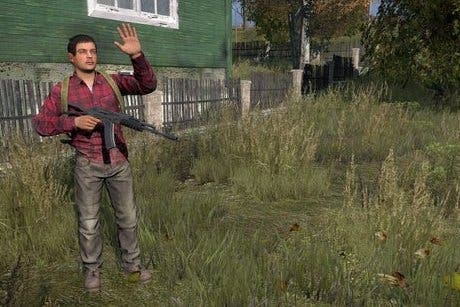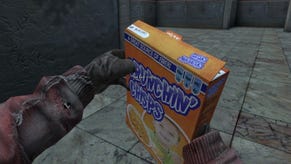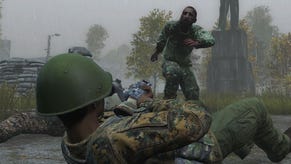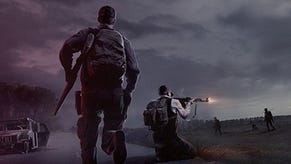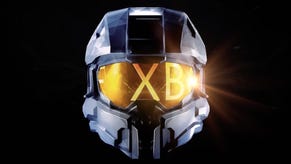DayZ without Dean Hall: What now?
A big interview for a big new year.
After a whirlwind three years Dean Hall has gone, left Bohemia, returned to New Zealand, started a new indie studio, walked away from day-to-DayZ. "Saying goodbye is like a mountain summit," he wrote on Twitter in December. "People focus on that, and forget that it is the journey there and then onward that really matters."
Now one man's creation is a team's responsibility, like Minecraft, and DayZ lives on, improving by the day. So who's in charge now? A collection of people.
"Dean was and always has been [not] so much a director as a screenwriter." An enthusiastic "cheerleader" for ideas, but, "The management of the project, as far as what gets worked on when, and how things are made, has always been the leads that Dean hired from the get go. Those people are still the people making the decisions."
That's Brian Hicks talking, the guy you'd see with Dean Hall at game shows. He was part right-hand man, part minder. Officially he's the producer, but I think it's telling that he's the person I'm talking in Hall's place now. I'll tell you a bit more about him in a moment, because he's important, but before then I want to be as clear with you as Hicks was with me.
"It is important to understand, Bertie, so we don't have an article that upsets the dev team, that this is a consensus," he says. "I don't do things that our lead gameplay programmer doesn't want to happen. If our engine programmer says there's a risk here and I really want it to happen, I will take his word for it. These people are leads for a reason. They are trusted with the vision.
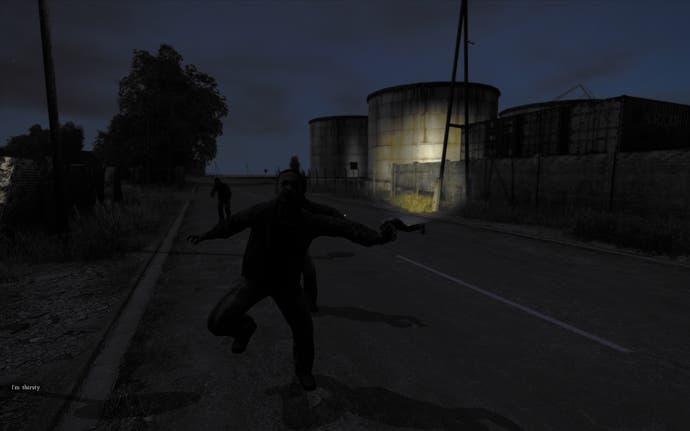
"I am, for lack of a better term, trying to keep everybody all on one vision together. If there's a dispute I'll jump in and try to settle it and keep everyone moving forward together. Development of this game will not work without these people singing like a choir, and so far, no problems."
On the DayZ blog before Christmas a new project leader for the game was announced: David Durcak. But Hicks explains to me that Durcak is an organiser, an enabler, a manager. He's not a content creator. For that there are the team leads and, higher level, lead designer Peter Nespesny and Brian Hicks himself.
"The takeaway for people is that Dean spent a year building a team that he trusts - people he feels that are capable, people he feels share his vision. And in that year he forged a vision of what DayZ should be, he even put it to paper. He spent time evangelising it to us, explaining things to us, playing it with us. The highway is already paved, we just have to get to the end of it."
There were vision documents drawn up that the team can turn to, and, of course, they can ask Dean Hall - he's in New Zealand, it's not like he's gone to Middle-earth. What's more, Hall and Hicks are best friends, and they speak all the time.
"I don't know many people in this country [Prague, Czech Republic]; Dean brought me here," Hicks says. "So you can betcha ass I'm talking to Dean all the time. We hang out outside of work even with Dean being in New Zealand."
They're in "Rocket's awesome people" Skype group - Hicks laughs loudly about the name - where people from around the world play games together. And they play "all the time", Hicks stresses - "after work, during weekends... We'll have binges of 20-hour Civilization games. So we're always talking; we don't need a set meeting schedule."
But if they need to talk, Hicks has Hall's phone numbers and vice versa, and the team leads have direct lines too. "He has a very strong impact on the title, even being 12-hour time difference from us. He might not be physically sitting at the desk throwing soda cans at the back of my head anymore but he's here, this is his game."
They haven't even cleared his desk out yet, not even the dirty dishes. Things are certainly quieter without... "a man-child", Hicks says, there every day. "But that's what makes him a great video game designer: he's always playing, he's always looking for ways to make things more fun, more interesting or to tinker with something." It'll certainly be interesting to see what he comes up with next.
Now: a bit about Brian Hicks. He came from Microsoft. He was in the Xbox Live Arcade team, an advocate and liaison for indie games, and he was obsessed with DayZ. He's clocked 3911 hours playing it, and if he's not playing he's watching, and if he's not doing that he's talking about it. That's how he winded up where he is now.
Hicks and a friend loved the brutal Japanese film Battle Royale and wanted to recreate something like it for DayZ Mod, so they ended up creating the Hunger Games tournament (eventually Survivor GameZ - Hall's name suggestion) and shot to number-one on Twitch. "It turned out that Dean watched the first event like the f***ing Superbowl!" Hicks laughs.
Hicks - probably against regulation - used his 'do not ignore me' Microsoft email account to send a flurry of emails to every Dean Hall address he could think of, because Hall had been crediting the wrong people on Twitter for the Hunger Games tournament. Hicks eventually got through and a friendship began.
They met at game shows and planned future Hunger Games support in the standalone DayZ game Hall hadn't announced yet. Before long, Hicks was helping Hall more officially with Microsoft and getting DayZ on Xbox (a platform it's still not announced for, incidentally - "I can't speak to that at this time, Bertie," Hicks states during this interview).
"It's just every time we talk to Microsoft they seem to screw it up," Hall apparently said back then. "It was frustrating," Hicks says, "because the people he would be talking to were not necessarily the wrong people - literally they were three office doors down from me."
There was a communication issue, and Hicks took things into his own hands. "Hey so I know Dean Hall," he told the guy down the hall. "You know me, we can make this work. Let me give you the down-low on what Bohemia wants to hear and then I'll tell them what Microsoft wants to know."
According to Hicks the sticking point was: "Bohemia didn't understand they had to flat-out ask Microsoft for it and Microsoft would say yes. It was kinda like trying to get a teenage boy to talk to a teenage girl: [they] didn't know the right things to say but they were both interested."
Hicks was relaying all of this to Hall (shortly before Hall left to climb Everest in April 2013) when a thought struck him: "I just said, 'You should just f***ing hire me.' And Dean said, 'I'd hire you in a heartbeat.' And pretty much I said, 'Well do it.'" And he did.
DayZ struggles with a perception issue today. It seems like it's been in development for aeons because of the mod that came before. A free mod, to boot. Announce a 2016 release date (it's in alpha at the moment) and an eventual price increase, as Bohemia recently did, and there's immediate negative feedback. (There's probably a string of it on this article already). It will never be finished! They're milking Steam Early Access! It doesn't even work properly yet!
The price rise: "We talked about doing it from the get-go, that as the game progressed in development we'd incrementally raise the price to our final price.
"Exactly when the price would raise throughout the development we didn't pick ... we didn't talk about that from the get-go - we just said it will be raising throughout the development. This is the first time we said, 'All right, it's been a year of development, we're outlining the final price when it hits shelves.'"
It didn't help that DayZ was discounted in the Steam Holiday Sale immediately after. It gave people the wrong impression. It was meant to be "a last chance to get it at the original price", Hicks explains, but "a lot of people received it the other way". "Lesson learned: that definitely won't happen in the future - we'll give a good two-three weeks warning."
The 2016 release date: "I'm fairly certain we never committed to a ship-date. In fact, from the get-go, we told people this was going to be a two-point-five-to-three year development cycle. Three years would be standard but we're going to try and hit two-and-a-half years, and that would put us in 2016.
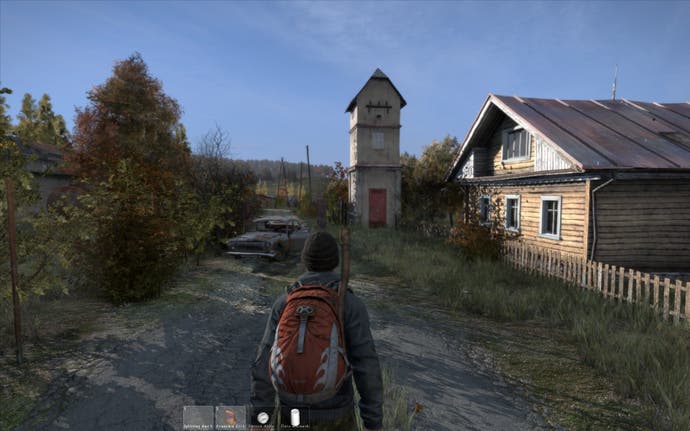
"But apparently I need to stand on the mountain tops and send out a press release for that to germinate. This is the problem: it's very difficult to get this information to your active userbase, let alone those who haven't bought the game. I've got a userbase of nearly 3 million people and it's incredibly difficult to make sure they get the information they need in the time they need."
The problem with Early Access: "Most consumers are not exposed to development cycles." He clarifies that what comes next is his opinion not Bohemia's.
"I feel that there's no structure to Early Access and every developer uses it in a different way and enters at a different phase in their development. And the consumers, you can't blame them for not understanding, because in order to make heads or tails out of the fact that everyone's doing this different, you need to understand the software development cycle completely. And gamers play f***ing video games, man - they're not looking to understand the SDL or how software is created, and they shouldn't have to, honestly.
"There needs to be some sort of loose - granted, because it's Early Access and it's indie titles - platform-enforced structure on communicating to your users where your title is in its development and when in that development you're entering Early Access. And without committing to ship-dates exactly, there needs to be platform-defined milestones."
Say there are six defined, common milestones: when you enter your game in Early Access you tell people which one you're at, so they understand where in the development cycle - where in the game's lifecycle - you are.
"And when you update your game, you update your progression," he goes on. There needs to be almost like a f***ing loading bar in a video game - there needs to be a bar of progression that consumers can see as you develop how close you are to your release. So at the very least, consumers understand where the game is, how far the game is from being shipped and what the word 'alpha' means for that title."
Despite its Early Access badge, DayZ has been a huge success, leaning "damn close to 3m" sales now. More surprising for Hicks, however, are the 1.1 million to 1.3 million different people actively playing the game each month. "It was very surprising. [But] we looked over the data three times and it's genuine."
There are 40 people working on DayZ, and almost all on the PC version. One or two people work on the console game - a prototype is pencilled for Q3 2015 - but there's not much they can do at the moment. "It's dependant on the PC version of DayZ being feature complete," Hicks explains, "because we can't move it over to console if we don't have the base game." It also requires the in-development DirectX 11 renderer to work.
Meanwhile, as DayZ development chugs along, new contenders in the survival genre emerge. There was Rust and now there's Sony Online Entertainment's H1Z1 (open beta begins 15th January). "I'm excited to play it," Hicks says - turns out he's doing a talk at PAX South with H1Z1 designer Jimmy Whisenhunt. "Sure we're both post-apocalyptic zombie-ish games, but they're aiming for a different type of audience," meaning the free-to-play audience. "That's a strong audience I've seen many games succeeding in, but that's not the audience I'm going to have for DayZ. There's plenty of room in this genre.
"I mean," he adds, "I spend most of my time... The developer I talk to the most to bounce ideas off, as far as Early Access, would be Gary [Newman] from Rust, so it's a small industry and it's a small genre. We all talk to each other."
There's a predictability to DayZ development that came on over the course of 2014, and there's a clear roadmap for 2015 already. In many ways it's become a known quantity, which again, happened with Minecraft. The fad part is over: now it's about digging in and reliably delivering. It is sad that Dean Hall probably won't fling wild ideas for DayZ around on stage any more, because he could be captivating, but I bet that's a relief for the people making it.
